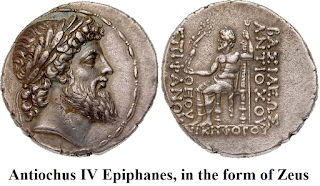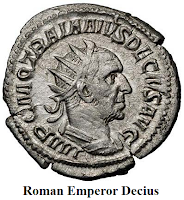v.
4a: “Then the herald loudly proclaimed…”
o The Herald functions as
a Mouthpiece—much like the Second Beast of Rev. 13: Rev.13:12: “It exercises all
the authority of the first beast in its presence, and makes the earth and its
inhabitants worship the first beast…”
v.
4b: "To you the command is given, O peoples…”
o A commandment—not
a suggestion!
o A reflection of the
Empire’s vast national & cultural diversity—pointing to the politically
unifying purpose behind the image.
v.
5a: “…that at the moment you hear the sound of the horn, flute…”
o
The
first of two distinct means employed to inspire conformity: ALLUREMENT!
The Way of Sin is made to appear appealing.
o
Music
is a powerful force and an effective means of stirring the heart.
o The inspirational &
suggestive power of music is effectively used to sell everything from
soap to political agendas…
o In the religious
realm, music effectively stirs the soul, arousing passion & awe.
o Music is a great
gift of God
(Ex. 15:20-21; Ps. 144:9;
Eph. 5:19; Rev. 5:8, 15:2)!
Ps. 150:3-5: “Praise him with
trumpet sound; praise him with lute and harp! Praise him with tambourine and
dance; praise him with strings and pipe! Praise him with sounding cymbals;
praise him with loud clashing cymbals!”
o It can also be misused
by the wicked, and by false religionists; note its early association with the Cainites
(Gen. 4:21).
o Music was of great
delight and importance to the Neo-Babylonians...
Isa. 14:11: “Your pomp is brought
down to Sheol, the sound of your harps…”
Ps.137:1-3: By the waters of
Babylon, there we sat down and wept, when we remembered Zion. On the willows
there we hung up our lyres. For there our captors required of us songs, and our
tormentors, mirth, saying, "Sing us one of the songs of Zion!"
o The exotic nature
of Nebuchadnezzar’s orchestra: the last two instruments are indicated by Greek
terminology.
o
This
underscores the cross-cultural contact & exchanges that Babylon had
with the Greek world, manifested in art, commerce, and various other realms.
o
Nebuchadnezzar was known to respect the Greek world,
employing their mercenaries as soldiers, and also gracing his throne room with
Ionic capitals on bright-yellow columns.
o
Liberal claims that the use of Greek terminology “proves”
that the book is of later Seleucid Era/Maccabean origins are thus preposterous;
and if so, why does the author use only a few Greek terms, rather than
many?
v.
5b: “…you are to fall down and worship the golden image…”
o An explicit call to
idolatrous worship—the key word—mention 11 x’s in this narrative
(vv. 5, 6, 7, 10, 11, 12, 14, 15, 18, 28).
o Again, the purpose is
to use the powerful means of religion to bolster & unify the state—which is
ultimately epitomized in the exalted ruler.
o Personality Cults remain central to
totalitarian regimes (e.g., Hitler, Mao, etc.).
o Nebuchadnezzar also
recognizes that the powerful religious impulse within man must be
appealed to, satisfied, and expressed in some form.
o Idolatry is reflective of man’s
natural impulse to satisfy his religious inclinations through some form of
concrete, visual expression (cf., Ex. 32:4; 1 Kings 12:28).
Ex. 20:4: "You shall not
make for yourself a carved image, or any likeness of anything that is in heaven
above, or that is in the earth beneath, or that is in the water under the
earth.”
v.
6: “But whoever does not fall down and worship shall immediately be cast into
the midst of a furnace of blazing fire.”
o
The
second means designed to inspire conformity: FEAR! God’s Way is
made to appear hateful, and repellant.
o Note disturbing parallels
to the later activity of Antiochus IV Epiphanes (r. 175-164 BC)—a forerunner to
Antichrist—in enforcing religious idolatry in order to bring unity to his kingdom,
as recorded in the history of 1 Maccabees:
41-42: “And king
Antiochus wrote to his whole kingdom, that all should be one people, and that
each should forsake his own laws. And all the nations agreed according to the
word of the king…” 47: “…that they should build altars, and
temples, and shrines for idols, and should sacrifice swine’s flesh and unclean
beasts…” 50: “And whoever shall not do according to the word of
the king, he shall die.” 54:“And on the fifteenth day of Chislev,
in the hundred and forty and fifth year, they built an abomination of
desolation upon the altar, and in the cities of Judah on every side they built
idol altars.”
o
Note
similar unifying efforts involving the religious exaltation of a man: e.g., Emperor-worship under the Caesars (foreshadowing that of the Beast; Rev.13:12,15).
o The edict of Emperor
Decius (c. AD 250) required that individuals
obtain a certificate (libellus) signed by a magistrate, proving that they
had sacrificed unto the gods and unto the well-being of the Emperor.
v.
7: “…all the peoples, nations… fell down and worshiped the golden image…”
o
Compulsion
in worship is fraudulent, and worthless to God; true devotion belongs to the
interior of man’s being—the realm of the soul.
John 4:23-24: “But the hour is
coming, and is now here, when the true worshipers will worship the Father in
spirit and truth, for the Father is seeking such people to worship him. God is
spirit, and those who worship him must worship in spirit and truth."
o
Under
such conditions & inducements, few refused to bow down—but three men did!
These three foreshadow the martyrs of the Great Tribulation.
Rev. 13:15: “And it was allowed
to give breath to the image of the beast, so that the image of the beast might
even speak and might cause those who would not worship the image of the beast
to be slain.”
Rev. 20:4: “Also I saw the souls
of those who had been beheaded for the testimony of Jesus and for the word of
God, and those who had not worshiped the beast or its image and had not
received its mark on their foreheads or their hands. They came to life and
reigned with Christ for a thousand years.”


